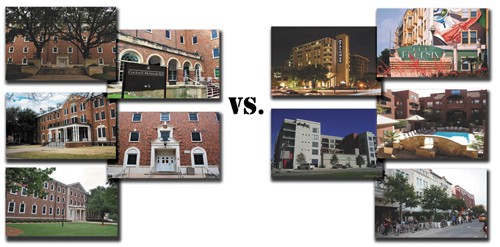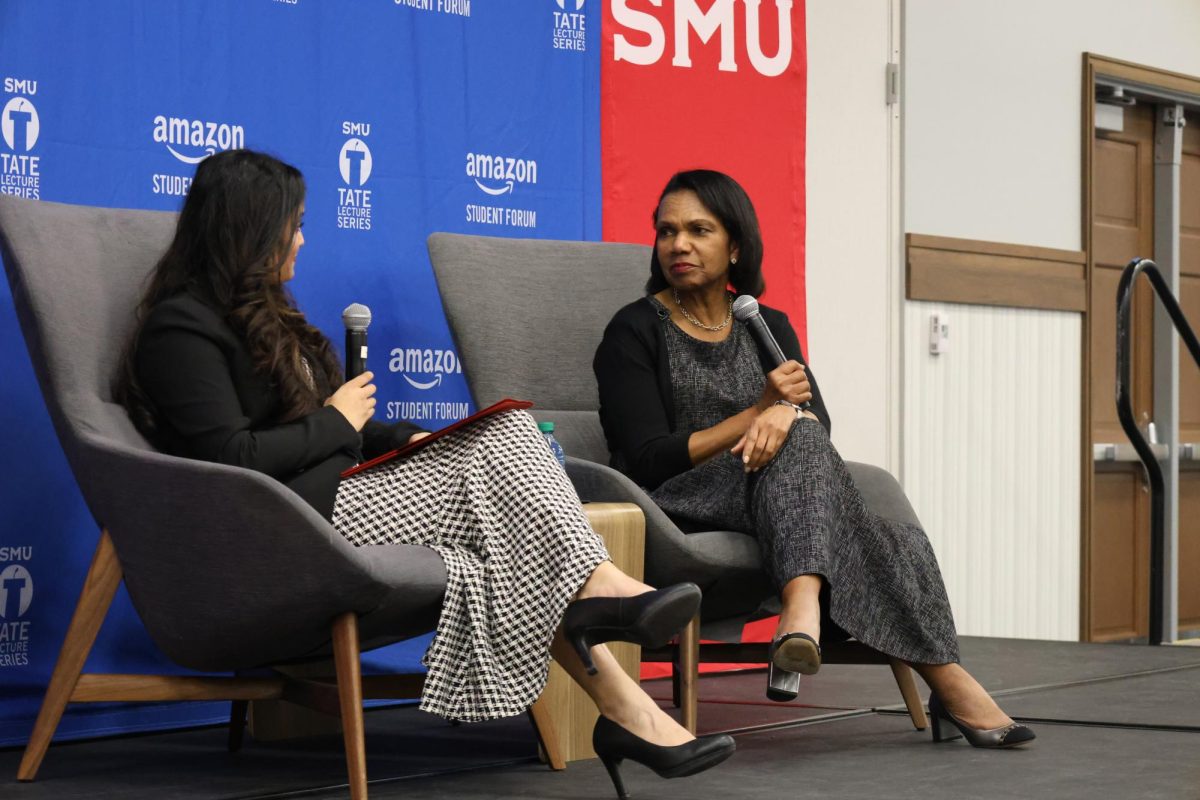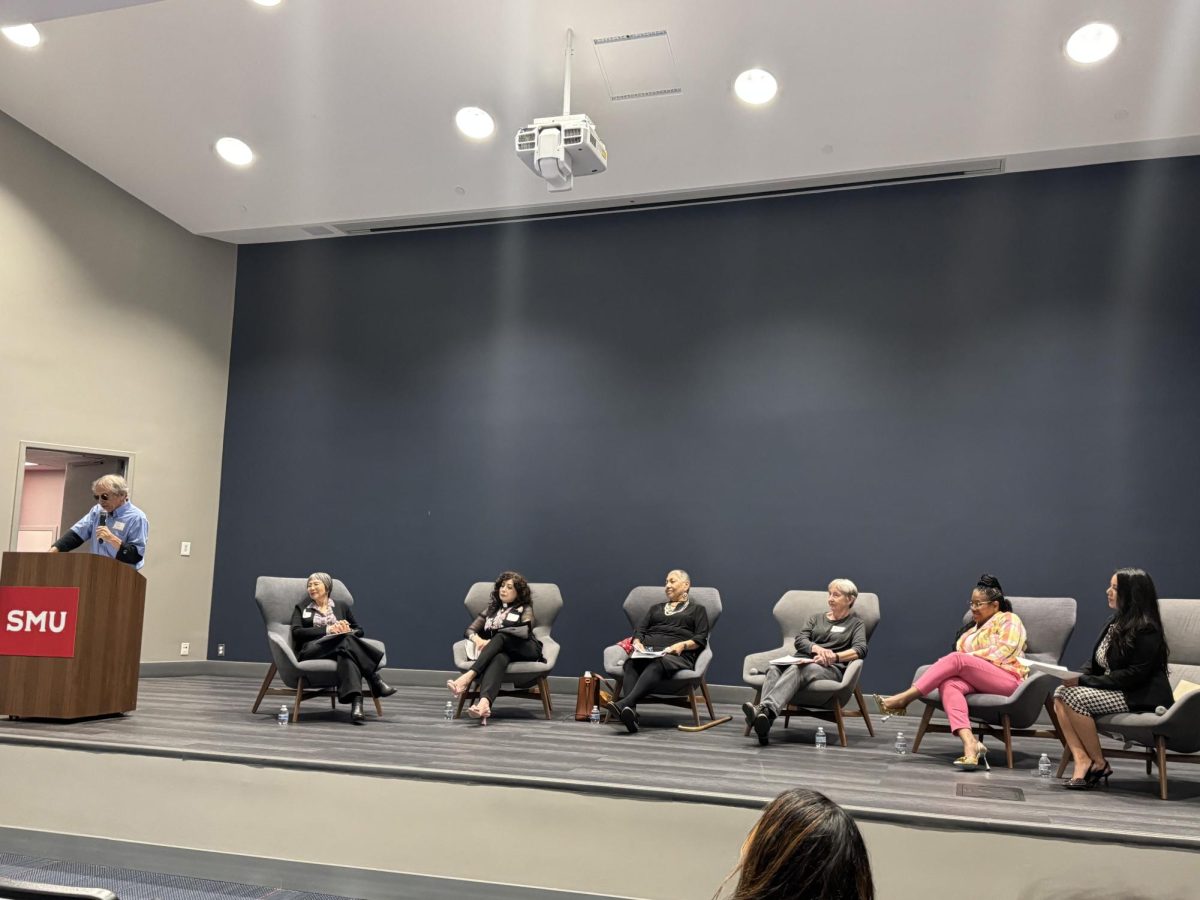
(Photo illustration by Michael Danser)
“I don’t know where I want to live next year,” admits SMU sophomore Chris White.
As the middle of the semester gets closer, many SMU students are beginning to think about their future living arrangements.
With the economy down, these decisions are based heavily on pricing. Though on-campus housing at SMU has a reputation for being very expensive, the immediate surrounding area is a hot spot in real estate.
“How much money is really saved when you move off campus?” SMU sophomore Rachel Singer wants to know.
“A lot of people think they’re saving tons of money, but after utilities/food/furnishing the apartment I feel like you might not be saving all that much,” she said.
Highland Park “is not a college town,” said area realtor and SMU alum Rogers Healy.
“Dallas has the number one market in the country, and [the SMU area] has the number one market in Dallas,” he said.
Healy started Rogers Healy and Associates when he was a junior at SMU. There was no centralized system that focused on housing around SMU, so he created one. His Web site LiveBySMU.com will connect you to a realtor who will help you find places that fit your needs. Like most realtor services, you don’t pay them; instead, they are paid by the property owners.
What many students don’t realize is that if they want to stay off campus, they are competing with parents who want their kids to go to school in the Park Cities school district, one of the best public school districts in the country, according to Healy.
You may find one at $900, but his best advice is to “be realistic.”
“If you want to live within walking distance of SMU, don’t expect to pay less than $1,000 per bedroom,” Healy said.
Healy says that essentially the cheapest place you’re going to find is $600 per bedroom.
You’re only going to find prices like these in the district that is six blocks east of I 75. If you find anything for less, he says you should “just sign right there.”
There are three places where many SMU students live off campus: The Phoenix off Mockingbird, the Carlisle apartments on University, and The Village on Lovers Lane, which has some houses available for rent as well as apartments.
Utilities (electric, heat/gas, water, phone, internet and cable) for a two-bedroom apartment generally run at $250 a month. If you spend $150 on food, you and another person will spend about $875 a month for a year-long lease if you stay in a $1,200 apartment uptown.
However, now is the time when the prices are at the very lowest. “It’s a catch 22,” Healy said.
Right now, there are listings for under $1,000 a month for two-bedroom apartments, which would have you and one other person paying $775 a month for 12 months.
If you wait for more options to be available, the demand goes significantly up, bringing the supply down. The prices of off-campus living are at their very highest in March, which means the best time to look is now.
To live on campus, “the least expensive housing options are the Service House and the Multicultural House,” says Executive Director of Residence Life and Student Housing at SMU.
“Both have a community kitchen,” which means you don’t have to purchase a meal plan. The Service House costs $805 a month divided over an eight-month period. With $150 for food, you will spend $955 a month for eight months.
When you look at the total cost for the year, if you jump on a cheap apartment now, you’ll be paying $9,300 for your total living expenses. To live in the Service House for two semesters, your total room will be $6,440. If you spend $150 on food a month, you will spend $7,640 for the school year.
Thus, if you want to spend less than you would in a residence hall, your best bet is to have a lot of roommates. If you and a roommate share a one-bedroom apartment, you could pay as little as $550 a month and $6,600 for your total living costs for a year.
Though you gain a certain independence from living on your own, there are really no community areas in the off-campus housing available.
Beyond that, you lose your ability to roll out of bed five minutes before class starts and still make it on time. Whether you stay on campus or not, it just depends on what’s more important to you: community and convenience, or independence and pinching your pennies.








